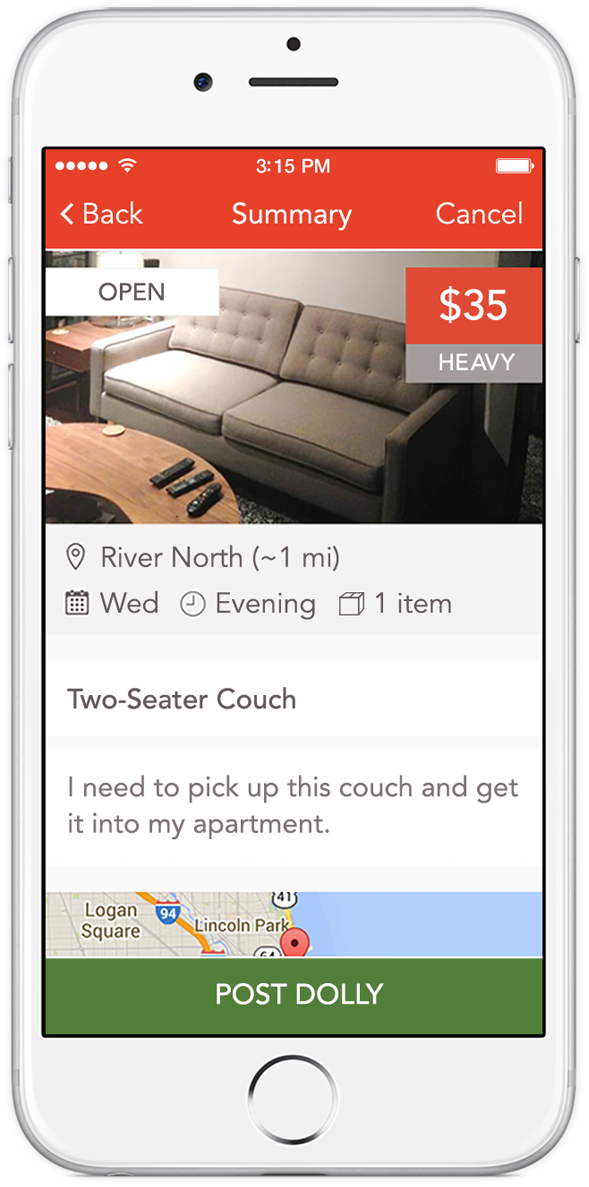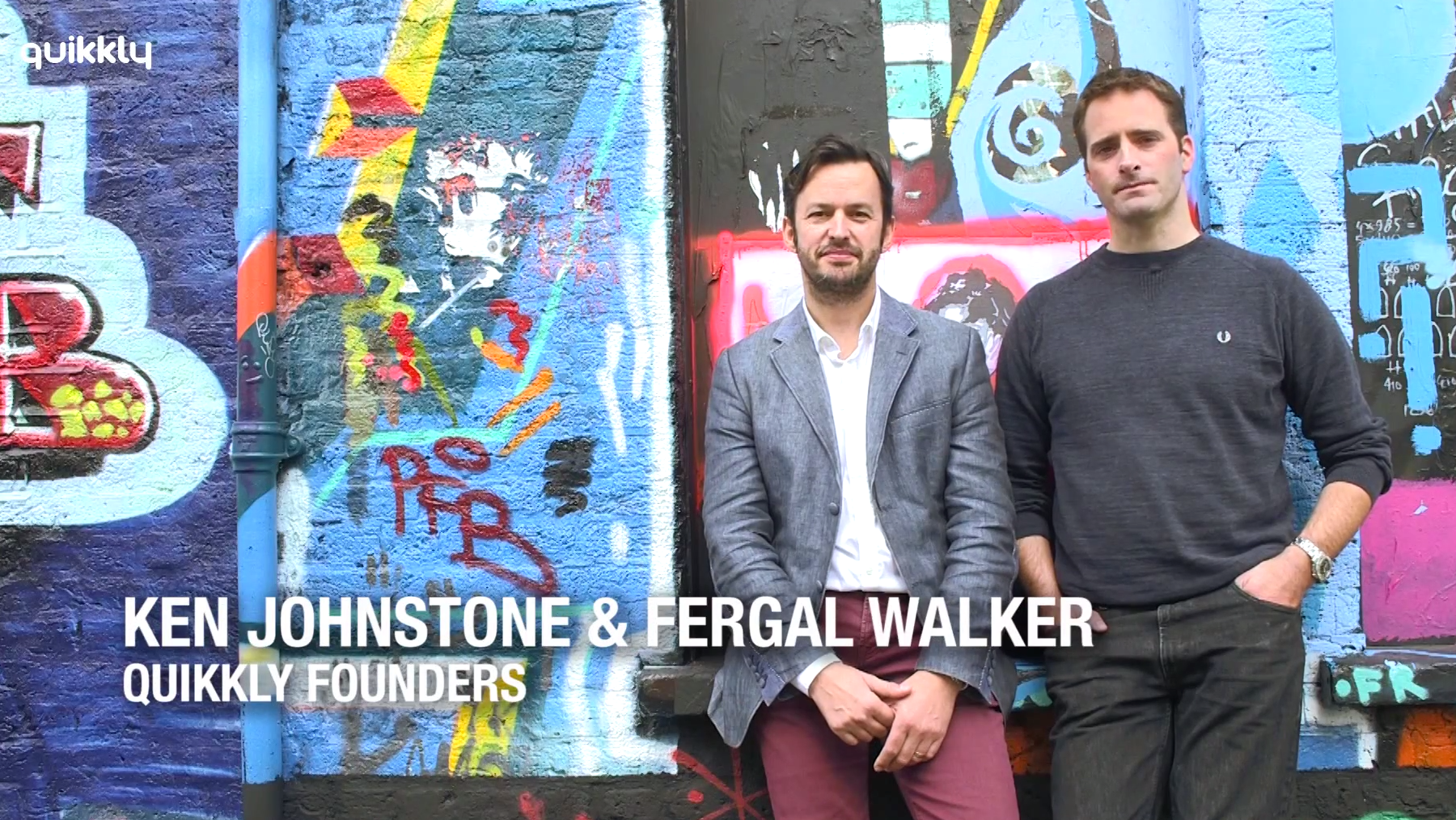 A Q&A with Dolly co-founder and CEO Mike Howell. The Seattle, Washington-based peer-to-peer moving and delivery startup closed a $1.7 million Seed funding round in mid-December. Investors include Hyde Park Venture Partners, KGC Capital and Angel investors. It was founded in 2013 by Howell, Kelby Hawn, Jason Norris, and Chad Wittman, and this is its first significant round of outside funding. The service is currently available in Chicago.
A Q&A with Dolly co-founder and CEO Mike Howell. The Seattle, Washington-based peer-to-peer moving and delivery startup closed a $1.7 million Seed funding round in mid-December. Investors include Hyde Park Venture Partners, KGC Capital and Angel investors. It was founded in 2013 by Howell, Kelby Hawn, Jason Norris, and Chad Wittman, and this is its first significant round of outside funding. The service is currently available in Chicago.
SUB: Please describe Dolly and your primary innovation.
Howell: Dolly is a mobile app that brings together people who need stuff moved with pickup truck owners who will do the moving for them. Whether it’s moving to a new apartment, picking up a new purchase, dropping something off at a local charity, or taking something to the dump, Dolly connects you with a background-checked ‘Helper’ who will do the moving and lifting for you. What Uber has done to the taxis business, Dolly will do to the local moving and delivery business. It’s fast, incredibly easy-to-use and affordable.
SUB: Who are your target markets and users?
Howell: We’ve been live in Chicago for a couple of months with the intention of refining the service there before launching other markets in 2015. We’re finding that we cater to a very wide range of customers because Dolly’s perfect for anyone who needs to move big, bulky or heavy items and doesn’t have the desire or ability to do it themselves. That’s a consumer problem that cuts across gender, socioeconomic, demographic and other typical target customer attributes.
SUB: Who do you consider to be your competition, and what differentiates Dolly from the competition?
Howell: Dolly was created precisely because the traditional options aren’t good. Asking a friend is awkward because you know they have better things to do. Renting a truck is time-intensive and requires you to do the heavy lifting yourself. Retail delivery fees are expensive for big items and typically take weeks to schedule. Local moving companies are incredibly expensive and provide a very antiquated experience.
With Dolly, it takes just minutes to get your stuff moving. Using the app, you tell us what, where, and when you need something moved and get an instant guaranteed price. Once you’re connected with a Helper, everything happens via the app—you can communicate directly with your Helper via text, track your Dolly via GPS, and pay with a credit card.
 SUB: You just announced that you’ve raised $1.7 million in Seed funding. Why was this a particularly good time to raise funding?
SUB: You just announced that you’ve raised $1.7 million in Seed funding. Why was this a particularly good time to raise funding?
Howell: For us, it wasn’t about whether it’s a great time to raise money or not, it was that the time for Dolly is now. The work that Uber, Lyft and Airbnb have done in shaping public perception about the sharing economy made this the perfect time to solve a different consumer problem with a similar approach.
SUB: How do you plan to use the funds, and do you have plans to seek additional outside funding in the near future?
Howell: We’re using the capital to build out our service in Chicago. We’ve nearly doubled the size of the team in the past month and are hard at work with new feature development and driving brand awareness.
We don’t have immediate plans to raise additional financing at the moment.
SUB: What was the inspiration behind the idea for Dolly? Was there an ‘aha’ moment, or was the idea more gradual in developing?
Howell: Like so many other folks, we’ve experienced the need for Dolly many times. The real ‘aha’ moment came early this year when my co-founder Chad was moving apartments in Chicago. He owns a car and could pack up and move most of what he owned in boxes except for the usual big items—his bed, couch, and dining table. Not wanting to go through the pain of renting a truck or the expense of hiring a moving service, he tried to go it alone. After much sweat and frustration, he realized that there must be a better way with all the technology at our disposal. That realization was the nugget that put Dolly in motion.
SUB: What were the first steps you took in establishing the company?
Howell: We built a basic prototype of the app and offered to do free moves for friends, family and a few folks we could find on Craigslist just to get some initial feedback on the idea. That went very well, and from there we started pulling together the business plan and brand look-and-feel.
 SUB: How did you come up with the name? What is the story or meaning behind it?
SUB: How did you come up with the name? What is the story or meaning behind it?
Howell: Collectively, we’ve all struggled with coming up with the names we love for our companies and products in the past—we’re serial entrepreneurs whose last companies were acquired shortly before we started work on Dolly—this name is too hard to spell, that name doesn’t make any sense, the other name is taken, so on and so forth.
Given what we are creating is such a mainstream, consumer-focused service, we wanted a short name that would resonate strongly with the audience. Over a discussion at lunch, the visual of a hand truck flashed into Chad’s mind. He couldn’t remember what it was called so he described it and one of our co-founders, Kelby, said: “Dolly!” We all thought that a hand truck was called a Dolly—it’s not—but the name stuck and was just as applicable. As soon as it was blurted out, we all knew that was the name that this business was destined to be.
SUB: What have the most significant challenges been so far to building the company?
Howell: Like any new business with limited resources, the constant struggle is focus. We need to be disciplined in what we say ‘yes’ to working on while being very practiced in saying ‘no.’ That’s really hard. Marketplaces are even harder because you have to cater to both sides of the market, so the need for focus is even greater. We’ve got two sets of customers that we need to build tools for and driving branding for.
SUB: How do you generate revenue or plan to generate revenue?
Howell: Like other marketplaces, we take a sliver of the transaction, and we started doing that early-on so we’re already generating revenue.
SUB: What are your goals for Dolly over the next year or so?
Howell: We’re dead-set on creating an incredible product, service, and support experience that solves the consumer need for a better moving and delivery service—first in Chicago and then in other markets around the U.S. Approximately 90 percent of the Dollys we’ve done to date have been rated as a five-star experience by our customers, so we’re well on our way. Give Dolly a try today—use the discount code ‘trydolly’ for 20 percent off your first use.












